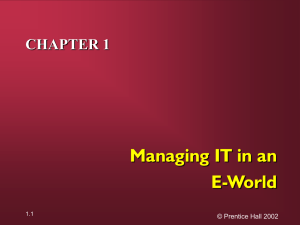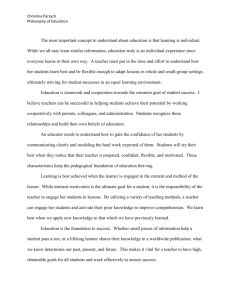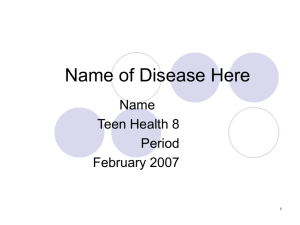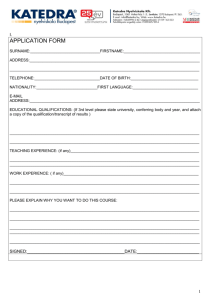A Multifaceted Challenge
advertisement
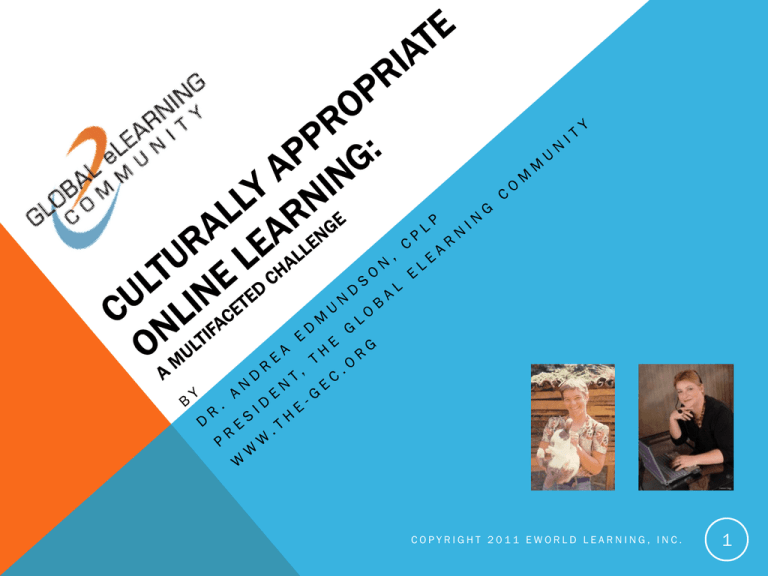
COPYRIGHT 2011 EWORLD LEARNING, INC. 1 SETTING THE STAGE Online asynchronous Disability Awareness course American instructor Includes non-US learners, English proficient 2 MULTIFACETED CHALLENGES Symptom Possible Reasons Research Tools Possible Solutions Reluctance to participate Lack of problemsolving skills High dependence on you, structure Concerns about assessment COPYRIGHT 2011 EWORLD LEARNING, INC. 3 RELUCTANCE TO PARTICIPATE Symptom Possible Reasons Research Tools Possible Solutions Reluctance to participate COPYRIGHT 2011 EWORLD LEARNING, INC. 4 RELUCTANCE TO PARTICIPATE Symptom Possible Reasons Research Tools Possible Solutions Reluctance to participate Power distance, hierarchy Foundational research on cultural dimensions • Explain extensively • Create a safe zone • Allow anonymity • Use techniques less reliant on language • Use Global English • Include practice Face saving Language skills Country Navigator™ Instructional technique Country-specific research on learning, educ. system COPYRIGHT 2011 EWORLD LEARNING, INC. 5 FOUNDATIONAL RESEARCH Hofstede’s National Cultural Dimensions http://geert-hofstede.com/unitedstates.html COPYRIGHT 2011 EWORLD LEARNING, INC. 6 CULTURE TOOLS Country Navigator™ The Essentials www.CountryNavigator.com COPYRIGHT 2011 EWORLD LEARNING, INC. 7 RELATED TOPICS Global English for Global Business http://writing.co.nz/globalenglish/index.htm COPYRIGHT 2011 EWORLD LEARNING, INC. 8 EDUCATIONAL RESEARCH KEY WORDS • Education • eLearning • Multicultural • Intercultural COPYRIGHT 2011 EWORLD LEARNING, INC. 9 LACK OF PROBLEM-SOLVING SKILLS Symptom Possible Reasons Research Tools Possible Solutions Lack of problemsolving skills COPYRIGHT 2011 EWORLD LEARNING, INC. 10 LACK OF PROBLEM-SOLVING SKILLS Symptom Possible Reasons Research Tools Lack of problemsolving skills Education system: roles, methods Country Navigator™ Content relevance Exposure to U.S. How they think! Possible Solutions • Use previous recommendations, especially practice Culture Wizard™ • Explain facilitated learning Directed • Scaffold content to research on contextualize content itself in • Offer multiple ways country context to access content, to participate Learner analysis COPYRIGHT 2011 EWORLD LEARNING, INC. 11 CULTURAL TOOLS COPYRIGHT 2011 EWORLD LEARNING, INC. 12 CONTENT RESEARCH “People with disabilities in China, prior to the year 1980, were referred to with discriminatory terms such as, "can fei," which means, "the handicapped and useless." There is still a great deal to be accomplished in order to realize the full equality, participation, and sharing of people with disabilities in China. Within the Chinese community disability may be considered a stigma. Oriental metaphysical concepts consider each individual's life span as a link on a chain, where each individual is seen as the 'product of all the generations of his or her family from the beginning of time'. Due to this link with ancestors, the existence of disability is sometimes explained as coming from ancestral spirits, trying.. Generally when a child with disability was born the child would often be regarded as a burden and as bringing shame on the family. The parents would… COPYRIGHT 2011 EWORLD LEARNING, INC. 13 HIGH DEPENDENCE ON STRUCTURE Symptom Possible Reasons Research Tools Possible Solutions High dependence on you, structure COPYRIGHT 2011 EWORLD LEARNING, INC. 14 HIGH DEPENDENCE ON STRUCTURE Symptom Possible Reasons Research Tools Possible Solutions High dependence on you, structure High level of uncertainty avoidance Foundational research, online cultural tools Teachers’ roles versus students’ Learner analysis Language skills Localization resources • Extensive explanations, including detailed syllabi, expectations, schedules • Alternate methods (video) • Early access to course materials Learner input! COPYRIGHT 2011 EWORLD LEARNING, INC. 15 LOCALIZATION RESOURCES COPYRIGHT 2011 EWORLD LEARNING, INC. 16 CONCERNS ABOUT ASSESSMENT Symptom Possible Reasons Research Tools Possible Solutions Concerns about assessment COPYRIGHT 2011 EWORLD LEARNING, INC. 17 CONCERNS ABOUT ASSESSMENT Symptom Possible Reasons Concerns about assessment Social All those expectations for discussed education, passing previously Uncertainty avoidance Unfamiliar with techniques (PBL) Research Tools Possible Solutions • Explain ‘success’ • Describe assessment and testing, “error” techniques Current research • Connect to motivation Learner analysis • Expect ‘cheating’ Learner input! COPYRIGHT 2011 EWORLD LEARNING, INC. 18 LEARNER INPUT Speaking for the 'Communist' generation, I remember how back in primary school, we were constantly encouraged to keep quiet (even in the canteen!) and literally to sit with our hands behind our backs. Small wonder then that to this day, most of us are uncomfortable with receiving praise, giving instructions to others, being presented with choice etc. --Martin Kralik, LinkedIn posting about Russian culture COPYRIGHT 2011 EWORLD LEARNING, INC. 19 LEARNER RESEARCH Solutions offered by the learners themselves: • Providing a well-defined and predictable course assessment schedule for preplanning • Awareness of cultural contexts in plagiarism practices • Multiple assessment methods and process-oriented assessment adaptive to different cultural styles • Providing more information on the cultural contexts or explanations of the culturally specific terms of the case study COPYRIGHT 2011 EWORLD LEARNING, INC. 20 CULTURAL ANALYSIS/AUDIT COPYRIGHT 2011 EWORLD LEARNING, INC. 21 CULTURAL DISCONTINUITY Cultural discontinuity is defined as “a lack of contextual match between the conditions of learning and a learner’s socio-cultural experiences.” (Wilson, 2001, p. 52) 22 OUR ULTIMATE GOAL Equitable learning outcomes Time Effort Results! COPYRIGHT 2011 EWORLD LEARNING, INC. 23 The CAP* Model Progressively more complex… The Course Level 1 Level 2 Level 3 Level 4 The Learners Examples 1: Content Computer skills, math Company policy Supervision Leadership, ethics 1: Environmental Time, distance, resources, technology, geopolitical 2: Approach 2: Socio-Economic Values, religion, gender differences, social status 3: Media 3: Communications Language, symbolism, gestures, body language 4: Other 4: Cultural Dimensions, esp. in education Individualism, power distance, low vs. high context, uncertainty avoidance, time orientation 5: Other Learning styles Adaptations Translate Localize Reusable Learning Objects Originate Other *Cultural Adaptation Process – an iterative, research-based process that allows educators, trainers, and instructional designers to accommodate the learning styles, preferences, and characteristics of learners in other cultures/countries. 24 THE MULTIFACETED CHALLENGE COPYRIGHT 2011 EWORLD LEARNING, INC. 25 CONCLUSION Research differences Prioritize needs Recommend changes Test recommendations Implement COPYRIGHT 2011 EWORLD LEARNING, INC. 26 RESOURCES Seminal cross-cultural research Hall, E. T. (1981). Beyond culture: Into the cultural unconscious. Garden City, NY, Anchor Press. Hofstede, G. H. (1997). Cultures and organizations: Software of the mind. London; New York, McGraw-Hill. Trompenaars, A. and C. Hampden-Turner (1998). Riding the waves of culture: Understanding cultural diversity in global business. New York, London, McGraw Hill. Websites http://geert-hofstede.com/national-culture.html Country Navigator: www.CountryNavigator.com Multilingual Magazine: http://www.multilingual.com/issueDetail.php Learning Times Podcast “Culturally Appropriate Instructional Design”: http://www.ltgreenroom.org/episodes/213 COPYRIGHT 2011 EWORLD LEARNING, INC. 27 RESOURCES My Publications Edmundson, A.L. (In press). Cultural implications in online learning. Hershey, PA, IGI Global. Edmundson, A. L. (2011). Cases on globalized and culturally appropriate elearning: Challenges and solutions. Hershey, PA, IGI Global. Edmundson, A. L. (2010). Training for multicultural audiences. Washington, D.C., ASTD Press. Edmundson, A. L., Ed. (2007). Globalized e-learning cultural challenges. Hershey, PA, Idea Group, Inc. COPYRIGHT 2011 EWORLD LEARNING, INC. 28
